Posted on
February 07, 2025 by
The VRG Blog Editor
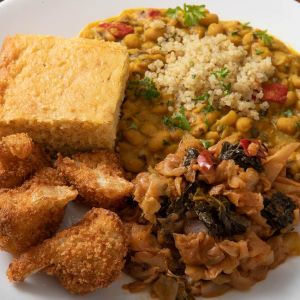
photo from I-Tal Garden
New Orleans has several vegan establishments where you’ll certainly find a good meal:
-2 Phat Vegans, 3613 General Meyer Ave., New Orleans, LA 70114 www.zmenu.com/2-phat-vegans-new-orleans-online-menu
-I-Tal Garden, 810 North Claiborne Ave., New Orleans, LA 70116 https://italgardennola.com/
-Sprouts Organic Café, 1200 Henriette Delille St., New Orleans, LA 70116 https://sproutsorganiccafe.com/
-Sweet Soulfood, 1025 N. Broad St., New Orleans, LA 70119 https://sweetvegansoulfood.com/
-Vegan Snack Shack, 3100 Toledano St., New Orleans, LA 70125 https://vegan-snack-shack.square.site/
Category
Uncategorized
Comments
0
Posted on
February 07, 2025 by
The VRG Blog Editor

Due to the generosity of anonymous donors, The Vegetarian Resource Group each year will award $50,000 in college scholarship money to graduating U.S. high school students who have promoted veganism in their schools and/or communities. One award of $10,000 and six awards of $5,000, and additional runner-up prizes will be given. Entries may only be sent by students graduating from high school in SPRING 2025
We will accept applications postmarked on or before FEBRUARY 20, 2025. Early submission is encouraged.
Applicants will be judged on having shown compassion, courage, and a strong commitment to promoting a peaceful world through a vegan diet/lifestyle. Payment will be made to the student’s college (U.S. based only). Winners of the scholarships give permission to release their names to the media. Applications and essays become property of The Vegetarian Resource Group. We may ask finalists for more information. Scholarship winners are contacted by e-mail or telephone. Please look at your e-mail.
If you would like to donate to additional scholarships or internships, go to www.vrg.org/donate
Applications
Please click here to download a PDF of the application. However, applicants are not required to use an application form. A neatly typed document containing the information below will also be accepted as a valid application.
However, applicants are not required to use an application form. A neatly typed document containing the information below will also be accepted as a valid application.
Please send application and attachments to [email protected] (Scholarship application and your name in subject line) or mail to The Vegetarian Resource Group, P.O. Box 1463, Baltimore, MD 21203.
If emailing, please put your essay in a separate attachment with your first name and last initial. A PDF or Word document is preferred, but if you send a Google document, make sure permission is given so readers can access it. For more information call (410) 366-8343 or email [email protected].
Category
Uncategorized
Comments
0
Posted on
February 06, 2025 by
The VRG Blog Editor
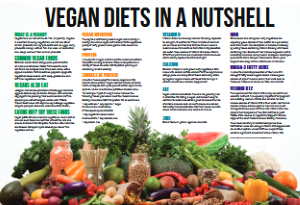
Share this handy poster with family and friends. You can also print it out and post it on your refrigerator. See: https://www.vrg.org/nutshell/VeganDietsinaNutshellPoster.pdf
Category
Uncategorized
Comments
0
Posted on
February 06, 2025 by
The VRG Blog Editor
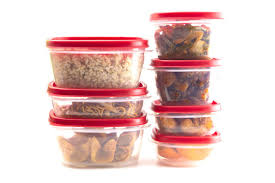
Adobe Stock photo
by Reed Mangels, PhD, RD
Maybe you made a big pot of soup and couldn’t finish it in one, or even two days. Or maybe you went out to eat and knowing that you couldn’t finish everything that you ordered, brought some food home with you. Leftovers are a part of life for many people. I love having leftovers that I can reheat and eat for lunch or dinner.
While leftovers are great, no one wants to get sick from eating spoiled food. Just how long can leftovers be safely stored?
According to the Food Safety and Inspection Service (FSIS) of the USDA, leftovers can be kept in the refrigerator for 3 to 4 days. One helpful trick is to write a date 3 to 4 days from the time a leftover was first refrigerated on a sticker or a piece of masking tape that you place on the container of food. That way you’ll know that this is the last date to eat the food. If you prefer, you can set up an alert on your phone to remind you to either eat the food or discard it.
If you don’t think you’ll eat all of the food within 3 or 4 days, you can freeze all of it or freeze the amount you don’t think you’ll eat. According to the FSIS, properly packaged leftovers can be stored in the freezer for 3 to 4 months without a loss in quality. After that, the food is still safe to eat but may be dried out and not as flavorful. I keep a list of frozen leftovers on my refrigerator to remind me that they are there waiting to be used for an easy meal.
For the sake of food safety, leftovers should be refrigerated within 2 hours of being cooked. If it’s a hot day, and the food has been sitting out in a place where the air temperature is above 90 degrees Fahrenheit, the food should be refrigerated within an hour of being cooked.
Cold perishable foods such as hummus or tofu salad should be discarded if they’ve been left out of the refrigerator for more than 2 hours at room temperature or for more than 1 hour if the air temperature is above 90 degrees Fahrenheit.
To read more about food safety see:
Food Safety for Vegan Parties
A Quick Food Safety Review
Nutrition Hotline (see page 2)
Category
Uncategorized
Comments
0
Posted on
February 05, 2025 by
The VRG Blog Editor
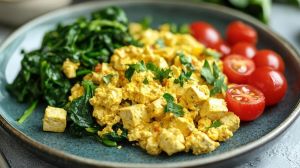
The spread of Avian Flu has led to the killing of many birds and a sharp increase in egg prices. You can make scrambled “eggs” without using eggs from birds. Chef Nancy Berkoff, EdD, RD, says, “Soft tofu makes a good scramble. Scramble soft tofu with a sprinkle of hot sauce or Tabasco, soy sauce, or miso if you’d like a smooth dish. Pile on the chopped tomatoes, olives, bell peppers, chilies, mushrooms, and green or yellow onions for a hearty scramble.”
Vegan Journal Senior Editor Hannah Kaminsky offers, “Some Americans consume eggs in the morning, but have you heard of the Indian street food sensation taking the world by storm? Bread Omelets wrap up a fusion of French toast, scrambled eggs, and an egg sandwich all in one neat package. My vegan version is made with chickpea flour seasoned with black salt for the same sensation, without the eggs or dairy. Find her recipe in this article: https://www.vrg.org/journal/vj2021issue1/2021_issue1_breakfasts_savor.php
Category
Uncategorized
Comments
0
Posted on
February 05, 2025 by
The VRG Blog Editor
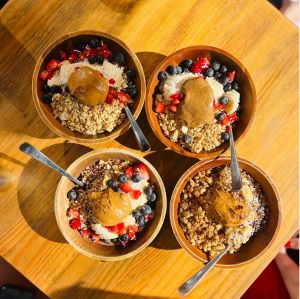
photo from Under The Mango Tree
If you’re visiting Miami Beach, Florida, this winter, stop by these vegan restaurants:
-Full Bloom Vegan, 1670 James Ave., Miami Beach, FL 33139 https://fullbloomvegan.com/
-Planta, 850 Commerce St., Miami Beach, FL 33139 https://www.plantarestaurants.com/location/planta-miami/
-Under the Mango Tree, 737 5th St., Miami Beach, FL 33139 https://under-the-mango-tree.square.site/
Category
Uncategorized
Comments
0
Posted on
February 04, 2025 by
The VRG Blog Editor
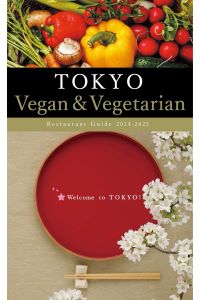
Russ Kaufman says: On Sunday we were in the Chiyoda-Marunouchi area of Tokyo. We went to a small typical Osaka-style Okonomiyaki (savory cabbage pancake) shop. Usually the only options in the past would be a seafood or meat option (or combination option—most popular are probably octopus or pork). Now it is common at these shops for an all-vegetable option on the menu. It’ s much easier than when I lived in Tokyo decades ago. Here’s the Tokyo Vegan Ramen Center. https://www.instagram.com/tokyo.vegan.ramen.center/?hl=en
The Tokyo vegan vegan and vegetarian restaurant guide should be helpful. https://www.gotokyo.org/book/en/list/5175/
Another member Steve said:
When I was in Japan way back in October-November 1987, a useful trick was to say “Shai shoku shugi shaa desu,” which roughly means “I am a Buddhist vegetarian.” If I just told them that I was a vegetarian then they didn’t take it seriously, but the Buddhist part made them believe that I was committed for religious reasons and therefore they shouldn’t sneak in something.
From our former intern Hiroko from japan
https://www.vrg.org/journal/vj2003issue3/2003_issue3_noodles.php
https://www.vrg.org/journal/vj99nov/1999_nov_japanese_holiday.php
https://www.vrg.org/journal/vj2001jul/2001_jul_kyoto.php
https://www.vrg.org/journal/vj2000may/2000_may_japanese_restaurant.php
https://www.vrg.org/journal/vj99sep/1999_sep_vegetarianism_japan.php
https://www.vrg.org/journal/vj99sep/1999_sep_shizuka_tsuruta.php
Category
Uncategorized
Comments
0
Posted on
February 04, 2025 by
The VRG Blog Editor
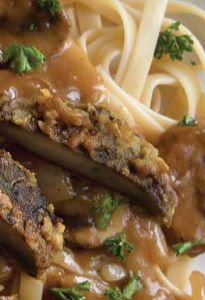
Mushroom Marsala photo by Rissa Miller
Chef Joseph Solar shares a wide variety of noodle dishes in his recipe piece in Vegan Journal. Start cooking Stuffed Shells with Basil, Golden Beet Japchae, Mushroom Marsala, Classic Vegan Pad Thai, or Vegan Carbonara!
Find the complete article here: https://www.vrg.org/journal/vj2022issue4/2022_issue4_noodling_around.php
Subscribe to Vegan Journal in the USA only at https://www.vrg.org/member/2013sv.php
Category
Uncategorized
Comments
0
Posted on
February 03, 2025 by
The VRG Blog Editor
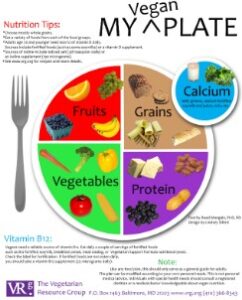
Nothing beats a simple graphic to get the vegan message out! The Vegetarian Resource Group created My Vegan Plate to display on outreach tables at various events. If you live in the United States, you can request copies of this handout to distribute by emailing us at [email protected]
You can view the handout here: https://www.vrg.org/nutshell/MyVeganPlate.pdf
This same handout can also be read in Spanish here: https://www.vrg.org/images/miplatovegano.jpg
We also have a version you can print out for kids to color on: https://www.vrg.org/nutshell/MyVeganPlateCP.pdf
Donations towards this outreach are always appreciated: www.vrg.org/donate
Category
Uncategorized
Comments
0
Posted on
February 03, 2025 by
The VRG Blog Editor
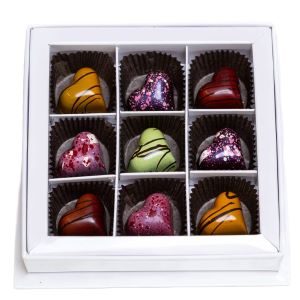
photo from Dallmann Chocolates
Are you looking for places to purchase vegan chocolate for Valentine’s Day? Here’s some online sources that sell vegan chocolate:
Amanda’s Own Confections (chocolate confections) https://amandasown.com/products/holidays/valentines-day/
Cocoa Parlor (vegan organic chocolate bars and truffles) https://www.cocoaparlor.com
Coracao Confections (vegan chocolates) https://www.coracaoconfections.com/
Dallmann Chocolates (vegan chocolates) https://dallmannconfections.com/collections/vegan-chocolates
Divine Chocolate (variety of vegan chocolate bars) https://shop.divinechocolateusa.com/Vegan/c/DivineChocolate@Vegan
Lagusta’s Luscious (variety of handcrafted vegan chocolate) https://lagustasluscious.com/
Lake Champlain Chocolates (wide variety of vegan offerings) https://www.lakechamplainchocolates.com/seasonal-chocolates/vegan-valentine-chocolates
Natural Candy Store (vegan items indicated) https://www.naturalcandystore.com/category/vegan-candy
No Whey Chocolate (vegan and kosher) https://nowheychocolate.com/valentines-day-chocolate/
Category
Uncategorized
Comments
0










